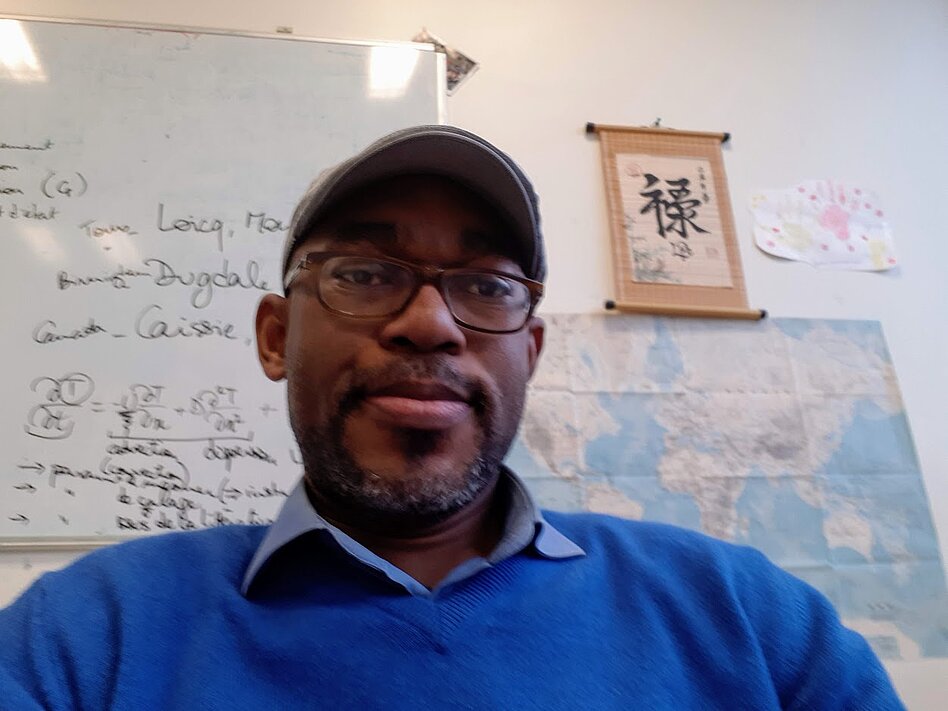Habilitation Thesis «Variably saturated porous media – Application to urban effluent treatment » May 2014.
Postdoc In the framework ofEuropean project“Artwet project”: « Mitigation of agricultural non point-source pesticide pollution and phytoremediation in artificial wetland ecosystems »
Postdoc « Oxygen transport and transfer in porous media »
Ph.D 2005 "Transfer mechanisms and evaluation of the oxygenation capacities and treatment of vertical flow constructed wetland – Model development", Strasbourg University, France.
Master, Rheological behavior of bentonites and polymers mixture. Strasbourg University, France.
Continuum mechanics,
Fluid mechanics,
Hydrogeology,
Numerical method,
Computational engineering,
Chemical engineering,
Constructed Wetland Modelling
Geographic Information System (GIS) for Groundwater Management
Reactive transfers in porous media,
Water flow and transport in porous media
Constructed wetland for urban effluent treatment: design, monitoring, processes and modelling
Stormwater treatment and management,
Soil phytoremediation,
Groundwater modelling,
Constructed wetlands for pollutants and micropolluants removal (since 2005) |
Constructed wetlands are considered as ecological engineering treatment wetlands used for urban and rural effleunts treatment. As knowledge developed in this field:
Constructed wetlands instrumentation and long term monitoring on field conditions,
Model development for understanding water flow, pollutant transport and bioremediation through porous media,
Automatic differentiation for sensitivity analysis,
Full scale tracer experiment
Micropollutant (polycyclic aromatic hydrocarbons (PAHs) and drugs residues) removal
Soil phytoremediation (since 2015) |
Soils pollution with hydrocarbons is on the increase, especially in developing countries like. Identifying plant species capable of growing on hydrocarbon-polluted soils remains an essential step in phytoremediation, a low cost, solar energy driven clean up technique in which living green plants are used. As knowledge developed in this field:
Methodology for floristic surveys to identify plants with phytoremediation capacities in hydrocarbon-polluted sites was developed and applied in 4 African cities.
Experimental protocol to investigate the phytoremediation potential of plant species on soil contaminated with fuel oil was developed and tested
Urban river restoration and stormwater treatment (Since 2010) |
To reach this good status, the restoration of the river has been undertaken by the Urban Community of Strasbourg since 2010.
To have a global approach, this project is completed with the installation of alternative treatment of urban runoffs coming from the separated sewer network of three residential urban watersheds.
Sanitation Research Program: MAFADY PROJECT 2010 - 2014 |
MAFADY Mastering the sanitation chain from the household level in the coastal zone of Douala, and in the informal urban settlements of Yaoundé, Cameroon. The purpose of this project was to determine actions to undertake in the domains of sanitation, practices of the various actors, allowing the improvement of hygiene and human health not only in the coastal areas, but also in slum districts of the humid tropical large cities. In the domain of development, the project proposed tools and new mechanisms for concerted planning as far as sanitation on the level of large cities.
Milena Walaszek, M. Del Nero, Paul Bois, L. Ribstein, O. Courson, Adrien Wanko, Julien Laurent2018. Sorption behavior of copper, lead and zinc by a constructed wetland treating urban stormwater. August 2018 Applied Geochemistry 97. DOI:10.1016/j.apgeochem.2018.08.019
Nuel, J. Laurent, P. Bois, D. Heintz, and A. Wanko 2017. Seasonal and ageing effect on the behaviour of 86 drugs in a full-scale surface treatment wetland: Removal efficiencies and distribution in plants and sediments. Science of the Total Environment 615 (2018) 1099–1109
Nuel, J. Laurent, P. Bois, D. Heintz, R. Mosé and A. Wanko 2017. Seasonal and ageing effects on SFTW hydrodynamics study by full-scale tracer experiments and dynamic time warping algorithms. Chemical Engineering Journal 321 (2017) 86–96
Bois, P., D. L. Childers, T. Corlouer, J. Laurent, A. Massicot, C. A. Sanchez, and A. Wanko. 2017. Confirming a plant-mediated “Biological Tide” in an aridland constructed treatment wetland. Ecosphere 8(3):e01756. 10.1002/ecs2. 1756
Matsodoum, Ndemba, Djumyom, Wanko, Djocgoué, Kengne, 2016. Floristic surveys of hydrocarbon-polluted sites in some Cameroonian cities (Central Africa). INTERNATIONAL JOURNAL OF PHYTOREMEDIATION 2018, VOL. 20, NO. 3, 191–204.https://doi.org/10.1080/15226514.2017.1365334
P. Matsodoum Nguemté & G. V. Djumyom Wafo & P. F. Djocgoue & I. M. Kengne Noumsi & A.Wanko Ngnien, 2018. Water Air Soil Pollut (2018) 229:88. doi.org/10.1007/s11270-018-3738-9
For more details: https://www.researchgate.net/profile/Adrien_Wanko
Modélisation diphasique de l’écoulement dans les filtres verticaux pour le traitement des eaux usées (Forquet, 2009 ; co-encadrant)
Modélisation et optimisation des processus de dépollution biologique de matrices poreuses contaminées par des pesticides : vers une nouvelle fonctionnalité des bassins d’orage (Tapia-Padilla, 2010 ; co-encadrant)
Nouveau matériau utilisable en chaussée perméable et épuratoire dans les zones urbaines (Bentarzi, 2011 co-encadrant)
Filtres plantés et traitement des boues de vidanges sous climat sahélien : compréhension – expérimentation et modélisation des processus (Tadjouwa, 2016 ; co-directeur)
Modélisation des transferts diphasique et réactif en milieu granulaire fin (Petitjean soutenance en 2012 ; co-encadrant)
Constructed wetlands to remove emerging pollutants from separate sewer network in residential urban watersheds (Duclos, 2014; co-encadrant)
Modélisation phénoménologique et probabiliste des mécanismes d’action des contaminants dans une dynamique de temps long (Walaszek, 2018 ; Directeur de thèse) ;
Devenir des residus médicamenteux dans les zoens de rejet végétalisées (Nuel, 2017, Directeur de thèse) ;
Potentialité du consortium Algues-Bactéries pour le traitement des eaux usées et la récupération de la ressource (Pham Le Ahn 2018, co-directeur de thèse) ;
Phytoremediation des sols pollués en hydrocarbures en zone subtropicale - potentialité des plantes locales au Cameroun (Pulchérie nguemté inscrite en 2015, co-directeur de thèse) ;
Mécanisme de transfert et dynamique d’accumulation des résidus médicamenteux au sein de Filtres Plantés de Roseaux (FPRs) et de ZRVs âgées (Loïc Maurer, 2017-2020 ; co-directeur)
Transfert de masse en milieu poreux : modélisation, analyse de sensibilité et estimation de paramètres appliquées à deux études de cas (Mohammad Moeizzibadi, 2018 ; co-encadrant)
Modelling of natura convection in porous media : semi-analytical and numerical solutions (Amin Fahs, 2018-2021 ; co-directeur)

